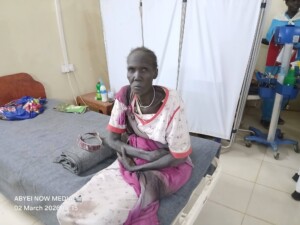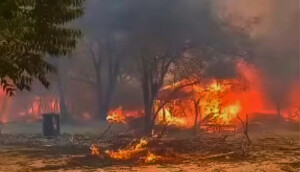24 killed in renewed West Kordofan clashes after cattle theft
At least 24 people were killed and others were injured in an ambush in Abu Zabad, West Kordofan, on Saturday. The attack caused tensions in the region to rise.
 Nomads water their herd at a rainwater hole, El Ayara, North Kordofan (Enikö Nagy)
Nomads water their herd at a rainwater hole, El Ayara, North Kordofan (Enikö Nagy)
At least 24 people were killed and others were injured in an ambush in Abu Zabad, West Kordofan, on Saturday. The attack caused tensions in the region to rise.
Abdelgader Munim Mansour, Nazir* of the Hamar tribe, told Radio Dabanga that a group of bandits stole about 170 sheep from Teiba Um Jafala, north of Abu Zabad town.
People in the area formed a search posse, he explained. “When they reached the area of El Mahfoura, the thieves fired a barrage of shots at them using a variety of weapons, which led to the death of at least 24 people and the wounding of others as we know thus far.”
He could not say if there were any dead and wounded among the attackers, as other sources reported.
The nazir said that the area is currently witnessing serious tension as a result of the ambush. He criticised the state’s security committee for refraining to intervene to contain the situation.
He said he would lead a delegation of native administration leaders from both sides to visit the area in an attempt to diffuse the tensions.
Recent clashes
The Hamar and Misseriya tribes were involved in serious clashes this summer after a dispute over border demarcations.
The problems between the two Arab nomad tribes started in July, when the West Kordofan Security Committee and Misseriya leaders formed a unilateral committee to demarcate the borders between El Sunut, dominated by Misseriya, and En Nehoud, mostly populated by Hamar, without notifying the latter.
Hamar Nazir Abdelgader Mansour told Radio Dabanga in August that the demarcation would almost certainly lead to the expropriation of large areas of land belonging to the Hamar, in favour of the Misseriya.
Despite Hamar requests to discuss the issue, the unilateral committee proceeded to redefine the borders. The Hamar then launched a number of protests in the state, including the closure of the En Nehoud-El Obeid road, and sent a delegation to Khartoum to bring the matter before the Sovereignty Council.
Sovereignty Council member Shamseldin El Kabbashi responded on August 31 by suspending the demarcation process.
Fighting broke out in Abu Zabad on September 11. The clashes that lasted until the next morning, left at least six people dead. More than 20 others were injured. The conflicting parties signed a reconciliation agreement on September 21.
In October, the Hamar held a series of protests to demand a new, Central Kordofan state, whilst the Misseriya stormed an oilfield to demand a continuation of the border demarcation and the cancellation of El Kabbashi’s decision.
On 13 October, clashes took also place between the Misseriya and local Nuba tribes after Misseriya tribesmen claimed a piece of land. Gunfire was exchanged in the market of Lagawa, which continued through 14 and 15 October, Radio Dabanga reported at the time. On 18 October, Lagawa was shelled by heavy artillery.
This conflict renewed a week later. Those displaced by this conflict are still facing a situation "worse than dire".
* A nazir is a state-appointed administrative chief of a tribe, according to the native administration system in Sudan











 and then
and then